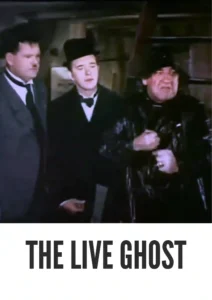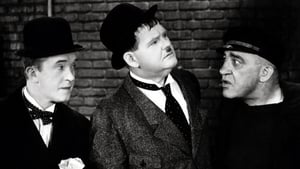Contact: info@alwanfilm.com
Video Sources 0 Views

Synopsis
Review: The Live Ghost 1934 Colorized – Rediscovering a Classic Comedy Gem

Introduction
“The Live Ghost” from 1934 is a memorable short film that showcases the comedic brilliance of the legendary duo Laurel and Hardy. This comedy, directed by Charley Rogers, brings a unique blend of slapstick humor and supernatural elements that continue to entertain audiences even today. In this article, we will delve into the world of “The Live Ghost,” exploring its plot, characters, and the timeless appeal of its humor. We’ll also discuss its significance in the context of film history and the enduring legacy of Laurel and Hardy.
Check The Full Colorized Movies List
Check Our Colorized Movies Trailer Channel
Understanding The Live Ghost 1934 Colorized: Director, Cast, and Genre
“The Live Ghost” is a short film directed by Charley Rogers, a frequent collaborator with Laurel and Hardy. Known for his knack for comedy, Rogers masterfully directs the duo in this film, bringing out their unique comedic styles.
The cast is headlined by Stan Laurel and Oliver Hardy, who deliver impeccable performances that highlight their extraordinary chemistry and timing. Laurel’s innocent, childlike persona paired with Hardy’s pompous and frustrated character creates a dynamic that is both hilarious and endearing. The supporting cast includes Walter Long, who plays a gruff sea captain, and Arthur Housman, who adds to the hilarity with his role as a perpetually drunk man.
“The Live Ghost” belongs to the comedy genre, specifically the slapstick comedy sub-genre that Laurel and Hardy excelled in. The film combines physical comedy with situational humor, creating a narrative that is as engaging as it is funny.
Exploring the World of The Live Ghost 1934 Colorized: Plot and Characters
The plot of “The Live Ghost” revolves around a series of comedic misadventures on a haunted ship. The film begins with a tough sea captain, played by Walter Long, who is having trouble recruiting a crew for his supposedly haunted ship. He enlists the help of Laurel and Hardy, who unwittingly get involved in his scheme.
Laurel and Hardy’s characters are initially reluctant but are soon coerced into helping the captain shanghai a group of drunks to serve as the crew. Among the drunks is Arthur Housman’s character, who provides a series of hilarious scenes with his inebriated antics.
Once on the ship, the comedy ramps up as the crew members, including Laurel and Hardy, encounter a series of spooky and funny events. The heart of the humor lies in their reactions to the “hauntings,” which are cleverly orchestrated misunderstandings and slapstick gags. One of the most memorable moments is when Hardy, mistaken for a ghost, causes panic among the crew, leading to a cascade of comedic chaos.
The Art of Film Colorization
Film colorization is the process of adding color to black and white footage. While this practice has its critics, it can also breathe new life into classic films, making them more accessible and visually appealing to modern audiences. Colorization involves careful attention to detail, ensuring that the added colors do not detract from the original aesthetic and tone of the film.
Early Colored Films: A Brief History
The history of early colored films is a fascinating journey of technological innovation and artistic experimentation. The first attempts at adding color to films involved hand-painting individual frames, a laborious process that was both time-consuming and expensive. As technology advanced, filmmakers experimented with techniques such as tinting and toning, which allowed for the addition of color to entire sequences.
By the 1930s, Technicolor emerged as a leading colorization process, revolutionizing the film industry. Despite the challenges and high costs, many filmmakers embraced color to enhance the visual storytelling of their films. The vibrant colors of Technicolor films captivated audiences and set a new standard for cinematic experiences.
The Live Ghost 1934 and Its Early Colored Version
Although “The Live Ghost” was originally filmed in black and white, the idea of a colorized version offers an intriguing perspective on how color could enhance the viewing experience. The film’s comedic elements, with its physical humor and exaggerated expressions, could potentially be amplified by the addition of color. From the eerie atmosphere of the haunted ship to the lively antics of Laurel and Hardy, colorization might provide a fresh and vibrant take on this classic comedy.
The Debate Over Film Colorization
The debate over film colorization is a contentious one. Purists argue that colorizing classic films alters the original artistic vision and historical integrity. They believe that the black and white aesthetic is an integral part of the film’s charm and should be preserved.
On the other hand, proponents of colorization argue that it can make older films more accessible to contemporary audiences, particularly younger viewers who may be less inclined to watch black and white films. They also contend that color can enhance the emotional impact and visual appeal of classic films, bringing new dimensions to the storytelling.
Examining The Live Ghost 1934 as an Early Colored Film
Considering “The Live Ghost” in a colorized format opens up new possibilities for appreciating its comedic genius. Color could potentially highlight the physical humor and enhance the visual gags that are central to the film’s appeal. For instance, the stark contrast between the eerie settings of the haunted ship and the vibrant antics of Laurel and Hardy could be accentuated through color, adding a new layer of visual comedy.
However, it is also important to recognize that the black and white format has its own charm and contributes to the film’s timeless quality. The interplay of light and shadow in black and white cinematography often adds to the atmosphere and mood, which are crucial elements in a comedy that relies on visual cues.
Influence and Legacy: The Live Ghost 1934 Colorizeds Impact on Cinema
“The Live Ghost” holds a significant place in the history of comedy films, showcasing the comedic talents of Laurel and Hardy at their peak. The film’s blend of slapstick humor, clever gags, and supernatural elements has influenced countless comedies that followed.
Laurel and Hardy’s impact on the genre is immeasurable. Their unique brand of humor, characterized by physical comedy and impeccable timing, set the standard for future comedic duos. Their influence can be seen in the work of later comedians such as Abbott and Costello, Martin and Lewis, and even contemporary acts like Simon Pegg and Nick Frost.
Director’s Cinematic Legacy: Beyond The Live Ghost 1934 Colorized
Charley Rogers, the director of “The Live Ghost,” made significant contributions to the world of comedy films, particularly through his collaborations with Laurel and Hardy. His ability to balance slapstick humor with coherent storytelling helped elevate the quality of short comedies during the 1930s.
Rogers’ work extended beyond his collaborations with Laurel and Hardy. He directed and wrote numerous films and shorts, often infusing them with a unique blend of humor and heart. His contributions to the genre helped shape the landscape of comedy films, influencing future generations of filmmakers.
Themes Explored in The Live Ghost 1934 Colorized
“The Live Ghost” is more than just a series of comedic sketches; it explores themes of fear, misunderstanding, and human folly. The film cleverly plays on the fear of the unknown, using the haunted ship as a backdrop for its humor. The misunderstandings that arise from the belief in ghosts lead to a series of hilarious situations, highlighting the absurdity of superstitions.
At its heart, the film also explores the theme of human folly. Laurel and Hardy’s characters are often victims of their own clumsiness and misguided decisions, leading to humorous but relatable predicaments. Their ability to laugh in the face of adversity and maintain their friendship despite the chaos around them adds a layer of warmth to the comedy.
Reception and Controversy Surrounding The Live Ghost 1934 Colorized
Upon its release, “The Live Ghost” was well-received by audiences and critics alike, who praised its humor and the performances of Laurel and Hardy. The film’s blend of slapstick comedy and supernatural elements provided a fresh take on the genre, cementing its place as a beloved classic.
In contemporary discussions, the idea of colorizing “The Live Ghost” has sparked debate among film enthusiasts. While some welcome the opportunity to see the film in a new light, others argue that colorization could detract from its original charm. This ongoing debate reflects broader discussions about the preservation and reinterpretation of classic films.
Where to Watch The Live Ghost 1934 Colorized Online
For those eager to experience the timeless humor of “The Live Ghost,” the film is available on various streaming platforms. Classic film enthusiasts can find it on services like YouTube, Amazon Prime Video, and dedicated classic film websites. Whether you choose to watch the original black and white version or a potential colorized rendition, “The Live Ghost” promises a delightful viewing experience.
FAQs About The Live Ghost 1934 Colorized
Q: Is “The Live Ghost” based on a true story?
A: No, “The Live Ghost” is a work of fiction, blending slapstick comedy with supernatural elements to create a humorous narrative.
Q: Who directed “The Live Ghost”?
A: “The Live Ghost” was directed by Charley Rogers, a frequent collaborator with Laurel and Hardy.
Q: What is the running time of “The Live Ghost”?
A: “The Live Ghost” is a short film with a running time of approximately 20 minutes.
Q: Is there a colorized version of “The Live Ghost” available?
A: As of now, “The Live Ghost” is primarily available in its original black and white format. However, discussions about potential colorization continue among film enthusiasts.
Conclusion
In conclusion, “The Live Ghost” from 1934 remains a testament to the comedic genius of Laurel and Hardy. Its blend of slapstick humor, supernatural elements, and timeless themes continues to entertain audiences of all ages. Whether viewed in its original black and white format or a potential colorized version, the film’s enduring appeal lies in its ability to evoke laughter and joy.
As we reflect on the legacy of “The Live Ghost,” it is important to appreciate the artistry and innovation that went into its creation. The film not only showcases the talents of its stars but also stands as a landmark in the history of comedy. By revisiting this classic, we are reminded of the timeless power of humor and the enduring impact of Laurel and Hardy’s contributions to cinema.








